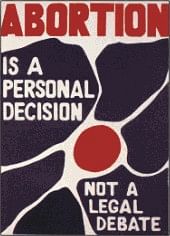Rights corner
Issues about reproductive rights
 |
cwluherstory-com |
Reproductive rights are rights relating to reproduction and reproductive health. Various reproductive rights have been claimed as human rights in international human rights documents, particularly with the ratification of the Convention to End Discrimination Against Women (CEDAW), and the adoption of the Cairo Programme and the Beijing Platform. Reproductive rights are often held to include the right to legal abortion, the right to control one's reproductive functions, the right to access quality reproductive healthcare, and the right to education and access in order to make reproductive choices free from coercion, discrimination, and violence.
While the term is often associated with the pro-choice position, which states that abortion should be a legal option for any pregnant woman, reproductive rights encompass more than the abortion issue. Reproductive rights were first discussed as a subset of human rights at the United Nation's 1968 International Conference on Human Rights. The sixteenth article of the Proclamation of Teheran states, "Parents have a basic human right to determine freely and responsibly the number and the spacing of their children."
Reproductive rights advocates work to secure affordable access to abortion, contraception, as well as education about contraception and sexually transmitted infections, and freedom from coerced sterilization and contraception, for both men and women.[citation needed] In addition, reproductive rights advocates endeavor to protect all women from harmful gender-based practices.[citation needed] Examples include cultural practices such as female genital cutting, or FGC, as well as state, customary and religious laws that contribute to women's political and economic disenfranchisement[
The United Nations Population Fund (UNFPA) is the United Nations main organisation for population and reproductive health issues. Most of its assistance to countries is provided in the area of reproductive health services, including family planning and information. These services are unquestionably the most effective means of preventing abortions. And to eliminate the need for abortions is UNFPA's goal. The United Nations does not promote abortion as a method of family planning. The legal status of abortion is the sovereign right of each nation. Most abortions can be prevented through quality family planning, but unfortunately contraceptive failure sometimes occurs resulting in unwanted pregnancy. Therefore, women will continue to seek abortion services -- this is a social reality. Whether or not abortion is legal in a country should not determine whether a woman receives health assistance for abortion related complications.
Facts about maternal health and abortion:
* Some 99 per cent of the estimated 585,000 maternal deaths worldwide annually occur in poorer countries. Of these deaths, 13 per cent are a result of complications from unsafe abortions.
* More women resort to abortion where family planning services and sex education are poor.
* Restrictive abortion laws do not prevent abortion but force women to seek illegal and usually unsafe abortions. In Latin America, where abortion is almost completely illegal, the rate is between 30 to 60 per 1,000. In the Netherlands, with Europe's most liberal abortion law, only five out of 1,000 women opt for abortion. The average of Western Europe is 14 abortions per 1,000 women.
* Of the estimated 45 million abortions worldwide annually, only 25 million are legal. At least 70,000 women die each year as a consequence of unsafe abortion, and millions more suffer severe health problems.
* Unsafe abortions account for some 25 - 50 per cent of maternal deaths in refugee situations.
In an effort to fight these meaningless deaths, UNFPA, the United Nations High Commissioner for Refugees (UNHCR) and the International Federation of the Red Cross in 1996 looked at the reproductive health needs of refugees from Rwanda, Burundi and Zaire in the Great Lakes regions of Central Africa. As a result, about 220,000 displaced women of child-bearing age received a package of reproductive health care services together with other emergency supplies.
The package addressed women's needs in family planning, including contraception; assisted childbirth; complications connected with unsafe abortions; sexual violence, including rape; and sexually transmitted diseases including HIV/AIDS. The reproductive health care package does not include abortion. The United Nations does not provide support for abortion or abortion related activities anywhere in the world. But the package contains information about health assistance to women experiencing abortion related complications.
The 1994 International Conference on Population and Development (ICPD) held in Cairo, Egypt, stated the following about the issue of abortion:
The status of a country's population policy, including the legal status of abortions, is the sovereign right of each nation. Unsafe abortion is a serious public health concern. Prevention of abortion and management of complications from abortions should be part of reproductive health, including family planning and sexual health programmes. Prevention of unwanted pregnancies must always be given the highest priority and every attempt should be made to eliminate the need for abortion. Each year, nearly 70 million women have unwanted pregnancies.1 The impact of these pregnancies will vary immensely depending on such factors as a woman's health, family relationships, economic resources, and the availability of medical care. These and other factors will influence her decision to either carry a pregnancy to term or seek an abortion. Given the complexity of this decision, the only person equipped to make it is the pregnant woman herself.
Source: Wikipedia, The United Nations Population Fund (UNFPA)
Compiled by Law Desk.